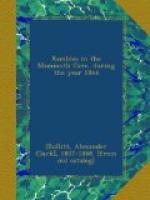“Ye mouldering relics of a race
departed,
Your names have perished; not a trace
remains.”
The Gothic Avenue was once called the Haunted Chamber, and owed its name to an adventure that befell one of the miners in former days, which is thus related by the author of “Calavar.”
In the Lower Branch is a room called the Salts Room, which produces considerable quantities of the sulphate of magnesia, or of soda, we forget which—a mineral that the proprietor of the Cave did not fail to turn to account. The miner in question was a new and raw hand—of course neither very well acquainted with the Cave itself, nor with the approved modes of averting or repairing accidents, to which, from the nature of their occupation, the miners were greatly exposed. Having been sent, one day, in charge of an older workman, to the Salts Room to dig a few sacks of the salt, and finding that the path to this sequestered nook was perfectly plain; and that, from the Haunted Chambers being a single, continuous passage without branches, it was impossible to wander from it, our hero disdained on his second visit, to seek or accept assistance, and trudged off to his work alone. The circumstance being common enough he was speedily forgotten by his brother miners; and it was not until several hours after, when they all left off their toil for the more agreeable duty of eating their dinner, that his absence was remarked, and his heroical resolution to make his way alone to the Salts Room remembered. As it was apparent, from the time he had been gone, that some accident must have happened to him, half a dozen men, most of them negroes, stripped half naked, their usual working costume, were sent to hunt him up, a task supposed to be of no great difficulty, unless he had fallen into a pit. In the meanwhile, the poor miner, it seems, had succeeded in reaching the Salts Room, filling his sack, and retracing his steps half way back to the Grand Gallery; when finding the distance greater than he thought it ought to be, the conceit entered his unlucky brain that he might perhaps be going wrong. No sooner had the suspicion struck him, than he fell into a violent terror, dropped his sack, ran backwards, then returned, then ran back again—each time more frightened and bewildered than before; until at last he ended his adventure by tumbling over a stone and extinguishing his lamp. Thus left in the dark, not knowing where to turn, frightened out of his wits besides, he fell to remembering his sins—always remembered by those who are lost in the Cave—and praying with all his might for succor. But hours passed away, and assistance came not; the poor fellow’s frenzy increased; he felt himself a doomed man; he thought his terrible situation was a judgment imposed on him for his wickedness; nay, he even believed, at last, that he was no longer an inhabitant of the earth—that he had been translated, even in the body, to the place of torment—in other words, that he was




